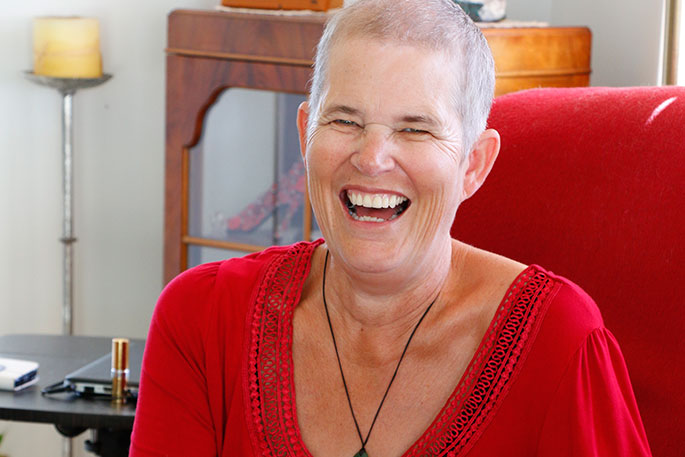Esther Richards was doomed to be 49 forever. That was her age when she was diagnosed with terminal brain cancer and she wasn't expected to live beyond that.
'But I am a scrapper,” says the Parkvale woman, who is now 52, still fighting the inevitable and laughing uproariously about it.
It's Esther's battle, her will to live and her will to die with dignity that's helped shift Tauranga MP Simon Bridges' attitude on one of the most sensitive and polarising issues of our time.
'I have always been conservative on the issue of voluntary euthanasia or the right to die,” says Simon.
One day Esther walked into his 3rd Ave electorate office and explained she didn't want to die alone. 'But I might have to and the prospect of that was pretty scary.”
'I told Simon that when my time comes I want those dearest to me, my family and friends, to be there, to sit with me, to talk to me and hold my hand. I want to take a tablet, go to sleep and I don't want them criminalised or to feel guilty for what I did.”
It's not that Esther wants to die. 'I have fought through three-and-a-half years of daily pain to be here. It would not be an easy way out. It would not be murder or suicide. But it should be an option – it should be my right – when I have had enough.”
She hasn't reached that point yet, so she lobbied Simon for the right to take control when she does. And while she hasn't changed his mind, she has helped shift his attitude.
The MP has been wrestling with the sanctity of life. 'Life is sacred,” says Simon. But while he's conservative, it seems his electorate isn't.
A substantial majority of his electors, 70 per cent, would support a law change allowing euthanasia. It's a fact borne out by the National MP's own electorate research.
'It doesn't entirely surprise me, but it's very clear public attitude has changed.” And Simon says, as a good MP, he'll have to think through what his electorate is telling him. 'But at the same time being true to my own conscience and views.”
Nearly 4000 constituents responded to the MP's survey question ‘Do you support a law change to allow voluntary euthanasia?'. It's not a scientific study but seen as a fairly good litmus test of voter thinking.
'Yes, I would think it's pretty accurate. It does show a real change in the way people are thinking as a result of some high profile cases.”
One of those high profile cases was Lecretia Seales. 'Pretty hard not to be touched by that,” says the MP. Lecretia \was the Wellington lawyer who unsuccessfully sought a landmark High Court ruling to allow her doctor to help her die without criminal prosecution.
Of the 3893 people who responded to Simon's survey 2727, or 70.04 percent, of constituents support a law change. Another 1166, or 29.95 percent, would not want a change to 'right to life” laws.
When broken down into genders, 1447 male Tauranga voters supported a law change and 612 didn't. Women were even stronger advocates for change with 1280 saying ‘yes' and just 554 against.
'While euthanasia is a conscience issue, the result of this survey would be a significant factor in how I vote.”
'Esther's story and the survey showed me it's an extraordinarily complex issue and it has slowed me down. It's not just the moral issues because 2016 technologies are keeping people alive a lot longer and there are also the issues of quality of life at the end.”
And this is the MP's concession to change.
'It's possible I would vote for a private member's bill to go to select committee so some of the complexities can be thrashed out.” But Simon would still want to be reassured there were very strong safeguards in place were he to consider changing his position.
'Apart from the sanctity of life, it's the slippery slope because vulnerable and elderly people may feel they are an inconvenience. And if the law isn't right in that regard, they may feel pressure to end their lives.”
'Apart from Esther, I have also had a number of constituents who are making valid decisions to end their own lives – people who are ill, people who don't want to be on support systems and propped up by advance technologies and drugs.”
But the MP is sure the same people accept there have to be processes and legal instruments in place 'so it's not an emotional decision in the heat of the moment”.
Meanwhile, Esther has a plan although she doesn't want to discuss it with The Weekend Sun.
'My son is fully aware of where I stand, he understands and he is supportive. And while some of my friends don't, they are also supportive of my decision.”
'But yes, you can say I have plans if the right time arrives.”
And Esther says the right time will be when her illness confines her to bed, she will leave it to the last possible moment, and she says: 'I will want to do it myself”.
But it also doesn't mean that when that time comes round Esther will make that decision. 'But I want the right to choose.”
And while the Health Select Committee goes through a very robust review of the euthanasia issue, Simon is picking the debate will come back as a member's bill. 'It does every four or five years. And the next time it is much more likely to result in a law change.”
Esther just may get her way.

